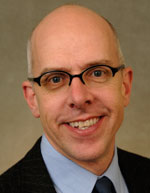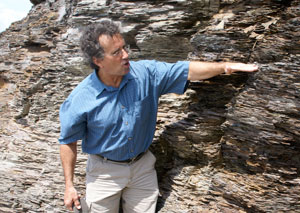|
|
 Dr. David Kinkela |
| About the Kasling and Hagan honors A tradition and honor at SUNY Fredonia since 1973, the Kasling Lecture is given each year by invitation. Kasling Lecturers are selected to explain the methods, purposes, and results of research or creativity which has earned them national reputations in their fields. The lecture is named for Robert W. Kasling, a professor of geography at Fredonia from 1946 to 1966 who was known for his integrity and high standard of scholarship. The Hagan Young Scholar/Artist Award is given during the Kasling Lecture event to a member of the teaching faculty who has made outstanding recent achievements in their professional pursuits. Named in honor of William T. Hagan, Ph.D., an eminent scholar specializing in the history of the American Indian, the award was initiated in 1987. |
|
Geosciences Professor Dr. Gary Lash will deliver the annual Kasling Lecturer on Tuesday, Oct. 16, while Associate Professor Dr. David Kinkela will receive the annual William T. Hagan Young Scholar/Artist Award.
The title of his 2012 Kasling Lecture is “...boring old shale - how simple questions can take one on a submicroscopic to global tectonic journey...”
Early in 2008, Lash and a collaborator released calculations on the amount of natural gas that the Devonian Marcellus Shale might hold. This attracted the interest of the natural gas industry and helped to make the Marcellus Shale the household word it has become.
Their work helped make shale gas and an important geopolitical relative to the search for cleaner and affordable energy sources. It was for this reason that Lash and Engelder were included in Foreign Policy Magazine’s list of Top Global Thinkers for 2011.
His research was done with Terry Engelder of Penn State University. Their collaboration continues.
Originally from Allentown, Pa., Gary Lash has been a professor with the Geosciences Department at SUNY Fredonia since 1981. Lash had been employed as a geologist with the State of Virginia and a researcher with the United States Geological Survey. While with the USGS and as graduate student at Lehigh University, Lash began working in the folded and thrusted Appalachian Mountain system of southeastern Pennsylvania with Avery Drake of the Survey.
Lash received the SUNY Fredonia Hagan Award in 1989 for his continued research in the Appalachian thrust belt. Over the years, Lash has published almost a hundred papers and chapter in peer reviewed journals and books, and has presented his research findings at many professional meetings. Moreover, he continues to involve his students in his work.
In the early 1990s, Lash began looking at deep-water sedimentary deposits in Newfoundland. Funded by the American Chemical Society (Petroleum Research Fund), Lash was able to include a Fredonia student in this research. Together, they spent several summers in Newfoundland studying a sequence of deepwater sandstones that had accumulated in basins adjacent to a volcanic arc.
In the mid '90s, Lash’s interests turned to the local stratigraphy, specifically the Devonian shale sequence so well exposed along the Lake Erie shoreline and in creek bottoms in western New York. This work has ranged from an analysis of the crustal stress levels and orientations that resulted in the fracturing of these rocks to the submicroscopic clay grain arrangement so critical to understanding fluid flow through these otherwise impermeable rocks. Early on, Lash and Professor Terry Engelder of Penn State initiated a collaboration that continues to this day.
Lash continues to study the Devonian shale succession, most recently addressing the use of inorganic chemistry as a means of understanding the environment of deposition of these deposits.
William T. Hagan Young Scholar/Artist Award
Currently an associate professor of history at the State University of New York at Fredonia, Dr. Kinkela received his Ph.D. in 2005 from New York University. He is author of DDT and the American Century: Global Health, Environmental Politics, and the Pesticide that Changed the World (UNC Press, 2011). His article, “The Ecological Landscapes of Rachel Carson and Jane Jacobs,” appeared in American Quarterly (December 2009). He is also the co-editor of a special issue of the Radical History Review entitled “Transnational Environments: The Political Economy of Nature in a Global Age, (spring of 2010). And more recently, Dr. Kinkela is co-editor of the forthcoming book, Nation-States and the Global Environment: New Approaches to International Environmental History, Oxford University Press.
Dr. Kinkela has presented his research at a number of conferences, including the American Society of Environmental Historians, the Society of the History of Technology, the American Studies Association, and the American Historical Association. In 2008-09, he was a research fellow at the Institute for Historical Studies at the University of Texas at Austin. And in 2010, he was a fellow at the Charles Warren Center for Studies in American History at Harvard University. He is also an editorial collective member for the Radical History Review.




